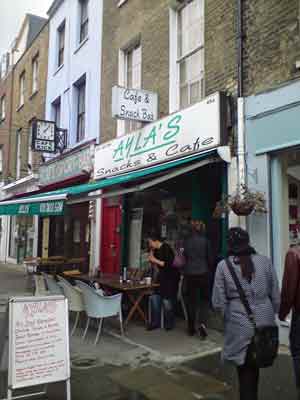On Wednesday evening we had a visit from an author who has just had her first novel published — Kirstan Hawkins whose book is ‘Doña Nicanora’s Hat Shop’. What was particularly special about this author visit is that Kirstan is an ex-student from the course, having been on the course two years ago. (I think this is correct as she said her novel was published 18 months after it was finished.) I guess that most of us chose to do this course because of its focus on the novel form and because of its links with the publishing industry (which will be concentrated on next term). Kirstan, therefore, was an ideal person for us to talk to because she’d been in exactly our position a couple of years ago and had gone on to do extremely well once the course had finished.
It was an absolutely fascinating and engaging hour in which Kirstan started by giving us some very relevant information about her own experiences and then answered some of our questions. I can’t possibly note down all the useful and thought-provoking answers that were discussed but a few points stood out from my own perspective.
One interesting point was that Kirstan said she’d never really set out to write a novel at first or overtly tried to set out on a career as a writer. Instead, she’d suddenly been grabbed by a series of ideas that were to later develop into the novel. While working on these ideas she’d enrolled in various creative writing courses, including a couple of Arvon foundation residential ones, Â and had spent about five years through courses and writers’ groups developing her craft, so to speak, before using the opportunities at the end of the City course to submit the novel for publication. I particularly noted her advice to let publishers and agents know what courses you’ve done as a writer. I guess I’d had a misconception myself that publishers had a masochistically romantic notion about fantastic writing being honed more by enduring the privations of some freezing, rat-infested squat and not venturing into the outside world for six months. I now realise what rubbish this is (mind you, this sort of exaggeration is probably routinely used to hype authors) — an agent or publisher is much more likely to realise an author is serious if he or she has spent several years and thousands of pounds on courses interacting with other writers and tutors, reading other quality fiction out there in the market and learning from criticism and being aware of theory. So doing courses like the first presentation of the OU Advanced Creative Writing course is more of an asset than I previously realised.
We focused quite a bit on agents as Kirstan managed to get signed up by hers remarkably quickly after the reading event for her year. (From looking on the internet her agent is Judith Murray at Greene and Heaton.) It sounds as if Kirstan found a really good agent and they have a very amicable and supportive relationship. However, Kirstan was careful to point out that the agent is principally someone who believes in the author and the novel with a passion — but that passion has to be passed on to a publisher (and not just a commissioning editor but various people like a marketing director) before a novel will stand a chance of publication. (There can be circumstances when editors leave publishers through redundancy and similar when a book in progress might be dropped if the new editor is not so keen on it.) So getting an agent is a vital step — but an agent can never guarantee anything to the new author. In financial terms both the agent and author are working out of love of the novel, rather than any monetary reward until an advance is paid — and, for a new author, that might cover some expenses but it’s not likely to be anything to swing from the chandeliers over.
What Kirstan said was most valuable about her agent was the editorial support. Some agents will not get particularly involved in the development of the novel and will expend their efforts on selling to publishers whatever is delivered by the author. As a new author, Kirstan was able to draw on her agent for advice in revising the manuscript. I was particularly interested in whether the sort of editorial advice from an agent was similar to that given by participants in writers’ groups or course workshops. Kirstan said that largely it was — although the advice from the professionals tended to be more definitive and assertive. She thought that the City group tended to be a little too polite and nice to each other and when there was a change to be made, for example if the leading character was introduced too late, then the other students would suggest bringing it forward a chapter or two whereas the editor and agent would say it had to be on the first or second page. Doña Nicanora’s Hat Shop’ is written in an extremely approachable and fluent prose style so I guess Kirstan wouldn’t find too much conflict with publishers in her genre but I’d be interested if writers who were on the more experimental end of the scale were ever pulled in opposite directions by peers who might love esoteric writing and perhaps agents who wanted something more commercial. I guess this is why choosing the right agent is so important. One point that certainly came over strongly is that Alison and Emily have very sound instincts in predicting what works and what doesn’t.
Kirstan told us about the huge amount of work that is involved with the publication of the novel — not just the various redrafts and proofs that need to be worked over but also the many different people in a publisher with whom a writer needs to meet. Then there’s also the expectation that a writer will self-generate at least some ideas for publicity (see other post mentioning Penny Rudge). All this work is done without any guarantee of financial reward, apart from the normally meagre advance, so the novelist also has to carry on as normal with the ‘day-job’. And then there’s the matter of trying to get round to writing a second novel. Kirstan came out with an amusing anecdote, saying that she’d been  in an interview with an agent about the content of her second novel, which she’d not really considered, and made up something on the spot. This spontaneous idea really did become the basis of the next novel — perhaps illustrating the suggestion that these ideas tend to stay just under the waterline in a writer’s subconscious but sometimes surface unexpectedly almost fully formed. Kirstan started to work on the second novel to relieve the moments of frustration and despair when the manuscript for Doña Nicanora’s Hat Shop’ was considered and passed over by various publishers but, paradoxically, once the novel was accepted then time to work on the next novel became at a premium.
One thing I didn’t realise is that the current edition of Doña Nicanora’s Hat Shop’ is what’s called a ‘trade paperback’ — which effectively seems to be a hardback sized paperback that’s relatively expensive. The idea is that trade paperbacks serve a similar purpose to hardbacks in terms of testing the market and being sent out for review. Fortunately Waterstone’s picked up on Doña Nicanora’s Hat Shop’ and included it briefly in their 3 or 2 offers — which is great exposure for a first novel. It is planned to publish the novel in a traditional paperback version when the comments from reviews can be printed on the cover and the price will be lower. I guess the publishers in the case of this novel would be keen to get it in the promotion for holiday reading — for which it would be very suitable, being set in an exotic Latin American location.
Emily and Kirstan talked about the present difficulties in the UK book retailing market — with Borders having closed down then Waterstones is really the only specialist national bookseller and it’s vital for publishers to try and get their books on the tables near the entrance to the shops. If a book isn’t going to sell in volume then it won’t get into the shop — they tend not to stock the odd two or three copies on the alphabetical shelves just to see if it will sell. Everything needs an angle which will help its marketing.
What Kirstan didn’t make too big a play of, but which seemed apparent to me, was how much hard work it takes to get a novel published and into bookshops and I really admire her dedication in having achieved it. It helps, of course, to have written a very good book. I was one of the people who brought in our copies of the novel. I’ve not finished it so far but I’ve enjoyed what I’ve read. What was most interesting, though, is that knowing she’d been on the same course as myself, I didn’t consider the text to be as inviolable as I normally would in a published book. I occasionally found myself in feedback mode thinking ‘I wonder why that exposition has gone there’ or ‘that’s a nice simile/metaphor’ or whatever.
So I think that meeting Kirstan and reading her book helps mentally bridge the conceptual gap between being the sort of creative writing student that she was herself and the prospect of seeing a book physically realised. However, there’s such a lot of work involved that all of us on the course must be a little mad for having this aspiration. I suppose that’s a test of having something you feel impelled to write about, even though it might make little logical sense, and that one’s belief in that may eventually manifest itself as a unique and original voice, which is what Emily emphasised agents and publishers are searching for and need to feel passionately about themselves.






